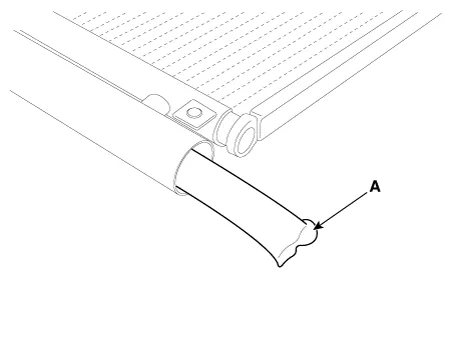Kia Rio: Air Conditioning System / Receiver-Drier
Repair procedures
| Replacement |
| 1. |
Remove the condenser. |
| 2. |
Remove the cap (B) on the bottom of the condenser with L wrench (A).
|
| 3. |
Remove the desiccant (A) from condenser using a long nose plier. Check for crumbled desiccant and clogged bottom cap filter.
|
| 4. |
Apply air conditioning compressor oil along the O-rings and threads of the new bottom cap. |
| 5. |
Insert the new desiccant into the receiver drier tank. The desiccant must be sealed in vacuum before it is exposed to air for use. |
| 6. |
Install the new bottom cap to the condenser.
|
Repair procedures Inspection 1. Check the condenser fins for clogging and damage. If clogged, clean them with water, and blow them with compressed air.
Description and operation Description The A/C Pressure Transducer (APT) convert the pressure value of high pressure line into voltage value after measure it.
Other information:
Kia Rio 2017-2023 YB Service Manual: Horn
Components and components location Component Location 1. Horn switch 2. Horn relay 3. Horn 4. Clock spring Repair procedures Removal 1. Remove the front bumper assembly.
Kia Rio 2017-2023 YB Service Manual: Rear Washer Switch
Repair procedures Inspection Multifunction Switch Inspection [BCM Type] 1. Check for continuity between the terminals in each switch position as shown below. [Left Handle Drive] Switch Switch position Switch terminal
Categories
- Manuals Home
- Kia Rio Owners Manual
- Kia Rio Service Manual
- Engine Control / Fuel System
- Suspension System
- Steering System
- New on site
- Most important about car



